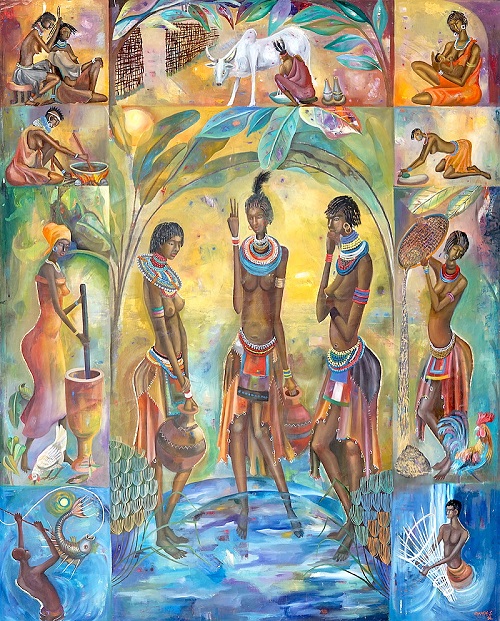
Samuel Kakaire work is true to the tradition of icon painting in its attention to detail
ART | AGENCIES | Afriart Gallery is proud to present a solo exhibition of Ugandan modernist painter Samuel Kakaire at Art Dubai 2024.
The presentation is part of the fair’s curated section ‘Art Dubai Modern’. Curated by Dr Christianna Bonin, assistant professor of art history at the American University of Sharjah and an expert in Cold War-era cultures and global modernisms, the section will explore artists and filmmakers from the Middle East, Africa and South Asia who took part in cultural exchange programmes with the Soviet Union and how the experience shaped their works and careers.
Founded in 2002 and located in Kampala, Afriart Gallery (AAG) has since become a leading international contemporary art gallery currently representing artists living and working on the African continent. The gallery focuses on original forms of expression and dialogue with the public. It provides an environment where collectors can find powerful contemporary artistic ideas and discussions.
Afriart Gallery was founded by Daudi Karungi a trained artist who understands the difficulties young artists on the African continent face. The gallery team is committed to creating a fair playing field and supportive community for artists by continuously implementing projects that foster their growth through mentorship, visibility, and archiving.
About the Artist
Samuel Kakaire was born in 1961 at Namalemba, Bugweri in Iganga District in Uganda. He attended Primary and High school in Uganda and graduated in 1989 from the Higher College of Industrial Art, St Petersburg, Russia with a Masters Degree in Fine Arts.
Ugandan cultures have never had a painting tradition as it is known in Europe. The principle art form in this part of the continent has always been music, through which people communicate their ideas, social values, hopes and aspirations. In the lyrics of earlier Ugandan music, one can find embedded most of this country’s pre-colonial ethnic history. In spite of European influences on Uganda’s education system, eastern European art is unknown.
A Ugandan painting icons, several thousand miles away from the birthplace of this tradition is therefore quite a unique phenomenon. On the occasion of the opening of the exhibition of Kakaire’s work in 1994, the Russian ambassador to Uganda was almost moved to tears of joy at the sight of icon painting which is in decline in his native Russia, but which is alive in distant Uganda.
Kakaire has specialised in tempera, oil and watercolors and can comfortably do both miniature and large-scale mural painting. Though, he currently works with oils on canvas, his earlier works were executed in tempera on wood panels. He uses the traditional limited palette of colors based on yellow ochre, red, black, white and blue. His work is true to the tradition of icon painting in its attention to detail, applied both to miniature and large scale works. His work is decorative and austere in appearance, as well as documentary in content. Most icons consist of explorations of a major theme or a central figure, usually located in the central area of the picture, with smaller interpretations located around the parameter of the painting. Both these qualities are characteristic of Russian icon painting.
When he mastered Russian icon painting, conservation and restoration, Kakaire absorbed the technique as well as the visual language of one of the oldest painting traditions in Europe. However, he has not used it to express religious ideas such as it was in Russia. He has instead taken the Russian visual language and adopted it to the local Uganda environment. The subject matter is distinctively Ugandan.
 The Independent Uganda: You get the Truth we Pay the Price
The Independent Uganda: You get the Truth we Pay the Price





